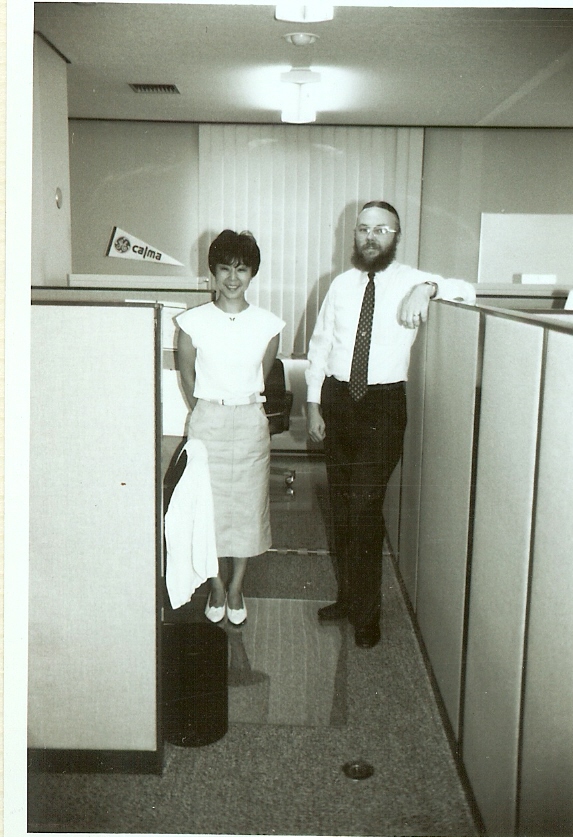The following is an article that I wrote while living in Japan in the mid ’80s and is reproduced from Viewport, volume 4, number 8, August 1984. Viewport was the company newspaper for Calma, the company I worked for at the time.

Thinking of Japan as samurai and geishas is about as realistic as thinking of America as cowboys and Indians. Japan is less different from America in many ways than I expected–especially Tokyo, which is a very cosmopolitan city.
But the differences are here. They are subtle differences in attitudes and values, in ways of solving problems, and in ways of handling social situations. In a business environment, these subtle differences can have great impact.
Japanese Work Ethic
One difference I have observed is the attitude of the Japanese toward work. Despite all the references to the “Puritan work ethic” in the United States, I think a lot of Americans have a negative attitude about work. “What is the minimum I can get by with?” “TGIF,” and so on. But I believe this attitude has always been less prevalent in the U.S. computer industry than elsewhere.
Generally, however, Japanese people are much more concerned with doing a good job, with being thorough and with keeping commitments. In large measure, this explains their reputation for quality goods.
Emphasis: quality, consensus, caution
I have noted three major differences in the way Japanese conduct business: their emphasis on quality, consensus and caution. In each of these areas I think both Americans and Japanese can learn from each other.
The Japanese emphasis on quality can be a source of frustration between Calma and CDS [C. Itoh Data Systems, Calma’s joint-venture partner in Japan] The Japanese cannot understand why a company would put out a product that has any hardware problems or software bugs. It is a great loss of face to a Japanese vendor, like CDS, to deliver software with flaws.
On the other hand, I believe that the Japanese expectation of bug-free software is unrealistic and partially explains why the Japanese lag behind the United states in software development.
The Japanese also place a great deal of emphasis on consensus. No decisions are made until the views of all parties concerned are solicited. This can be extremely frustrating for Americans from the electronics industry who are used to rapid change and quick decisions.
The third difference, related to the two above, is their attitude of caution. For instance, a Japanese programmer will carefully scrutinize a command he has keyed in and may even consult a manual before hitting RETURN.
An American programmer, such as myself, will instantly hit RETURN and let the computer indicate if there is something wrong. (Of course, I have gotten into trouble on occasion by doing that, but, in general, I think I get things done faster.) This is another area where we can learn from each other.
Consequence: more meetings
One of the consequences of the Japanese values of quality, consensus and caution is that there are a lot more meetings, and the meetings last a lot longer. I have finally adjusted to this way of doing business, but occasionally I remember how difficult it was for me initially.
I was reminded of this last February when a Calma Applications Engineer came over here to help us prepare for a trade show. The first thing we did, of course, was have a meeting to discuss what we would do. It lasted half a day.
One-job career in Japan
Another thing that I have noticed is that there is much less mobility among workers in Japan. The lifetime employment policy in Japanese companies engenders in workers a different attitude about how to succeed and how to get ahead. The Japanese will pick the best, biggest, most-established company to be found because this will probably be the company from which he/she will retire. Also, in Japan, the determining factor for salary increases is seniority. Even managers usually earn the same salary as others under them who started at the same time. Managers get more “perks” and bigger bonuses, but the fact that salary is tied to time on the job provides another incentive to stay put.
In the States, on the other hand, often people can advance or get an increase in salary simply by changing jobs.
Language barrier
Because more Japanese business people speak English than American business people speak Japanese, the Japanese have a tremendous advantage over us in terms of understanding the other’s culture and ways of thinking.
In spite of the language difficulty, I feel like I fit in fairly well. Of course, I miss out on some of the casual conversation (in Japanese) but more often than not someone will translate if they see that I am interested.
In terms of work, I think a major factor in business relationships–maybe all relationships–is mutual respect. I feel like I am respected, and I certainly have a lot of respect for the Japanese people with whom I work.